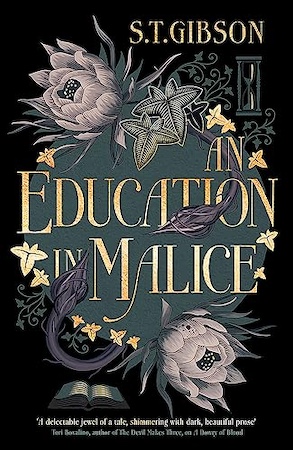I received this novel from Orbit Books through NetGalley, in exchange for an honest review. My thanks to both of them for this opportunity.
After the mild disappointment suffered from S.T. Gibson’s other new novel, Evocation, I had high hopes that An Education in Malice would fare as well for me as the author’s debut novel, A Dowry of Blood, and that the return to the theme of vampirism would re-create the lyrical writing that thad captivated me completely in that first book. But sadly that was not the case: I will have to add my disappointed review to the ones some of my fellow bloggers posted in the past few days….
The story, in a nutshell: Laura Sheridan arrives at the prestigious Saint Perpetua college to further her poetry studies under the tutelage of renowned professor De Lafontaine and she finds herself almost immediately put in competition with student Carmilla, who is clearly the teacher’s favorite. De Lafontaine, however, hides a dark secret and soon enough Laura will find herself enmeshed in a competitive triangle mixing academic learning and dark passions with unexpected consequences.
There is nothing that saddens me more than failed expectations, particularly where a review book I expressly requested is concerned, and after the amazing discovery that was A Dowry of Blood those expectations were quite high, but this book – like the other 2024 offering of the author, Evocation – did not stand the comparison with S.T. Gibson’s debut, a fact that made me wonder if the pressure of producing not one but two novels in the same year did not weigh too heavily on the author’s narrative powers. The novel is hailed as “sumptuous and addictive” but I would hesitate to use those terms because the prose, although still very close to the style used in Dowry, is certainly moodily descriptive but often fails in the dialogues that at times feel contrived, and rarely manage to convey any emotional layering from the characters.
As for the characters themselves, the relationship between Laura and Carmilla feels hurried, moving from hostile rivalry to insta-lust in too short a time to be truly believable: the novel unfolds by switching between the two girls’ POV, but their “voices” are too similar to offer any real difference between them, to the point that I often had to backtrack to the chapter’s beginning to confirm which one of them was relaying the events. The third point of the improbable “triangle”, that of professor De Lafontaine, constantly wavers between that of the oppressive adult who wields her power to abusive levels and that of the almost-mothering figure who still does not balk at taking advantage of her young charges. The revelation about the professor’s true nature as a vampire, and the impact it has on Carmilla directly and indirectly on Laura, is one that required a huge suspension of disbelief from me, because Laura’s almost passive acceptance of a situation that should have seen her run screaming for the hills is quite absurd.
My list of grievances could still run for a little while, but I see no reason to keep berating a story that seems to have captivated many other readers: clearly I’m not the intended audience for this book and I probably set the bar too high by expecting another compelling story as Dowry of Blood. Maybe someday in the future that will happen again….





















You must be logged in to post a comment.